The programming question and answer website StackOverflow conducted a survey on blockchain technology. What did 90,000 responses say?
Source: LongHash
Editor's Note: The original title was "Data Survey: What Are the Differences Between People Who Are Optimistic and Those Who Are Obsolete on the Blockchain? 》
Every year, StackOverflow, a programming Q & A site, conducts a large-scale survey of its community, covering almost every developer and code user on the network. The 2019 survey received nearly 90,000 responses, which asked several questions related to blockchain technology.
StackOverflow has published a summary of the analysis with a bar chart breakdown of the answers to each question. But StackOverflow also released the original survey results, giving us the opportunity to further study the data and analyze the blockchain "camp" in its developer community.
- Cut off three businesses in one year, co-CEO stepped down, Circle decides to die for stablecoin
- Deputy Director of the Science and Technology Department of the Central Bank: To establish a blockchain technology financial application innovation management mechanism
- Miss Japan's most beautiful bitcoin: I am chasing madly and constantly learning because I do n’t want to give up
One question is interesting. Respondents were asked: Blockchain / cryptocurrency technology is mainly–
1. Useful in many areas and can change many aspects of our lives
2. Useful for decentralized currencies (ie Bitcoin)
3. Useful for immutable record keeping other than currency
The tide
5. Irresponsible use of resources
Based on these five options, we can divide the respondents into two categories: those who are mainly positive on the blockchain (options 1-3) and those who are mainly negative on the blockchain (options 4 and 5) ). A total of about 60,000 people answered this question, of which 40716 people belonged to the group "positive attitude towards the blockchain" and 19449 people belonged to "group negative attitudes to the blockchain".
After analyzing the answers to the other questions from these two groups, we found some obvious differences. Of course, even though the survey has a very large sample size, some of these differences may still be the result of random probabilities. As you can see, many of these factors are interrelated, so it's hard to conclude that any answer is affected by the other.
Demographics
We found that developers who have a negative attitude towards blockchain are often slightly older than other respondents. The average age of the overall respondents and those who have a positive attitude towards the blockchain is 30, but the average age of developers who have a negative attitude towards the blockchain is 31.6 years. This difference is also reflected in other aspects. For example, compared with developers who have a positive attitude towards blockchain, developers with a negative attitude are more likely to engage in full-time work and are more likely to obtain a graduate degree. Developers who have a positive attitude towards blockchain are almost twice as likely as students.
Considering the obvious age difference, it may not be surprising that groups with negative attitudes towards blockchain have higher incomes. The median salary for this group is $ 71,166, while the median salary for groups that are positive about the blockchain is $ 56,110.
Although there is a similar bias in the overall gender ratio of the survey, the proportion of males (93% males and 5.7% females) among developers who have a positive attitude towards blockchain is slightly higher than the negative attitude towards blockchain Attitude developer group (90.8% for men and 7% for women). However, it is worth noting that compared with developers who have a positive attitude towards the blockchain (whites account for 63.4%) and overall respondents (whites account for 66.4%), developers who have a negative attitude towards the blockchain are more May be classified as white (80.1%).
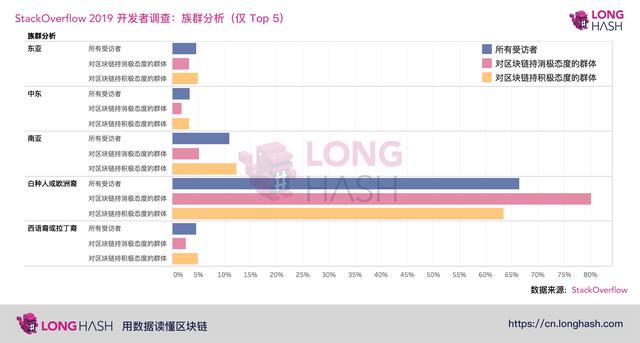
This may be related to the geographic location of the respondents: Indian developers accounted for 10.4% of the positive attitudes towards the blockchain, but only 3.4% of the negative attitudes towards the blockchain. If we take a closer look at one of the most promising options for blockchain (thinking that blockchain is useful in many areas and can change many aspects of our lives), the difference will be even more obvious: Among the developers who chose option one are More than 14% are from India.
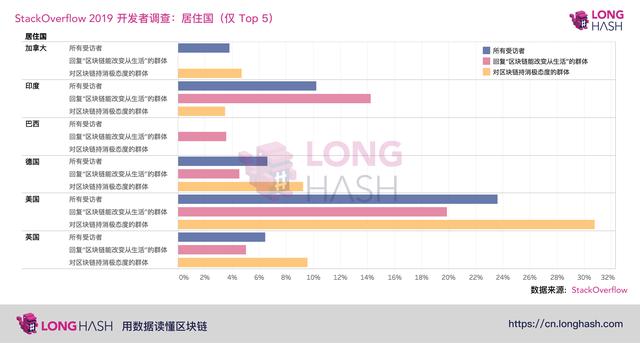
Indian developers also account for about 10% of the total number of people surveyed in this survey, but this does not mean that Indian developers are particularly interested in blockchain. On the contrary, these data seem to indicate that among the overall survey respondents, fewer Indian developers were pessimistic about blockchain than expected.
lifestyle
Although StackOverflow's survey doesn't focus on personality or psychology, it does raise an interesting question that involves these two points: Do you think that the generation born now will have a better life than the parents?
About 63% of survey respondents gave a positive answer, but the proportion of developers who are positive about blockchain is slightly higher: 68%. Developers who have chosen the most positive answer (useful in many areas and can change many aspects of our lives) are also more optimistic about this question, with a 71% positive answer.
On the other hand, developers who have a negative attitude towards the blockchain are even more pessimistic, with only 55% answering "yes". Developers who believe that energy chain is mainly an irresponsible behavior are even more dejected: only 50% of developers believe that this generation of children will have a better life than their parents.
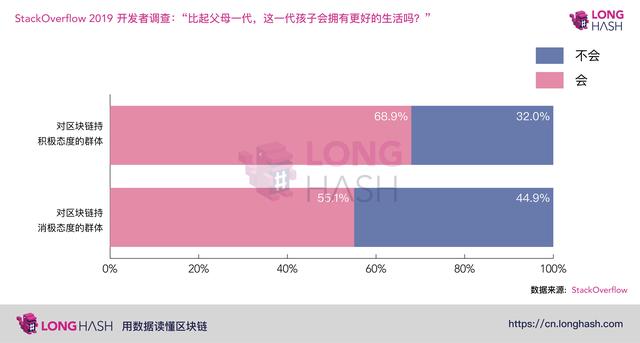
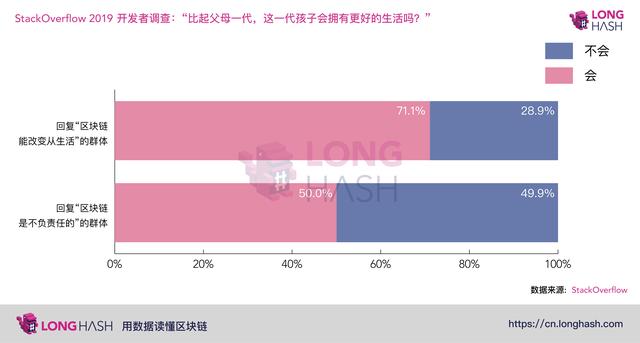
In terms of social habits, most people prefer Reddit-this is the most popular social media platform in both groups. However, in the subsequent rankings, the orientation of the two groups has once again diverged: the three major social media platforms preferred by developers who have a positive attitude towards the blockchain are Reddit, Youtube, and Whatsapp, while they have a negative attitude towards the blockchain The developers chose Reddit, Twitter and Facebook.
Who develops on the blockchain?
Unsurprisingly, developers who have a positive attitude towards blockchain are more likely to work for companies engaged in blockchain-related projects. Among them, 29.7% said that their company is engaged in blockchain or cryptocurrency-related businesses, and only 11% of developers who have a negative attitude towards blockchain work at companies involved in blockchain projects.
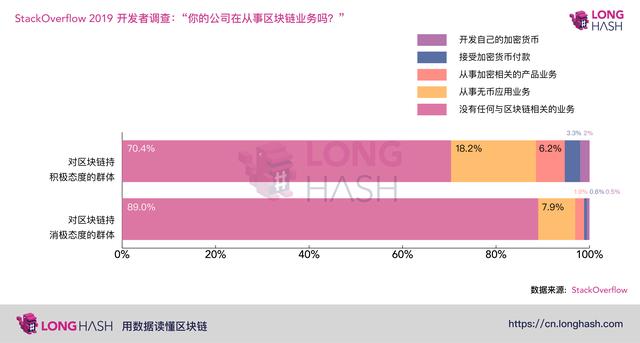
Of course, this also means that there are enough people among developers who have a negative attitude towards blockchain to engage in blockchain projects. In fact, according to StackOverflow data, 72 unfortunate developers have a negative attitude towards blockchain, but their company is developing their own cryptocurrency. It's no surprise that these people are 2.3 times more likely to say they are "very dissatisfied" with the job than the average survey respondent.
Why should we care how the developer community views blockchain technology? The answer is simple: Developers and technicians are the ones who are now responsible for developing blockchain projects and other technologies that will interact with these projects. So, for example, if there are more developers who are really passionate about blockchain in India — and this seems to be the case — then it could affect how the blockchain develops in the future.
LongHash , read the blockchain with data.
We will continue to update Blocking; if you have any questions or suggestions, please contact us!
Was this article helpful?
93 out of 132 found this helpful
Related articles
- What breakthroughs has Open Finance made in 2019? See how Pantera Capital summarized
- China Blockchain Policy Survey (2019)
- Chief Scientist of Bank of China: Blockchain technology can greatly improve bank operating efficiency
- Blockchain startup TradeWindow secures new round of funding, New Zealand ASB Bank participates
- Broker giant TD Ameritrade supports, ErisX will open bitcoin futures trading at 10pm tonight
- Chip giant AMD joins blockchain game alliance to empower blockchain gaming
- Someone used three models to predict the valuation of Bitcoin and found that …






